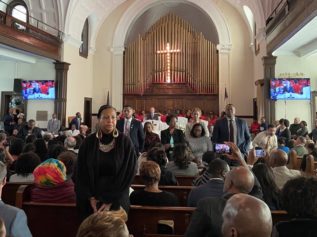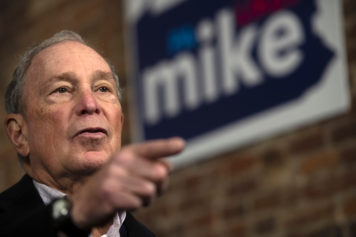New York City’s bizarrely entertaining mayoral campaign took a giant step toward the finish line last night as the most progressive candidate, Public Advocate Bill de Blasio, put a flourish on his quixotic run by winning the Democratic primary.
It was unclear whether de Blasio had garnered the 40 percent of the vote necessary to avoid a run-off, but he clearly trounced second-place finisher Bill Thompson, the city’s former comptroller. Unofficial tallies put de Blasio’s total at 40.2 percent, which would put him over the top, with Thompson a distant second with 26 percent. But thousands of paper absentee ballots still have to be counted, a process that could take weeks.
City Council Speaker Christine Quinn, the openly gay early frontrunner in the mayoral race, won an embarrassingly low 15 percent of the vote—while disgraced former Congressman Anthony Weiner, won 5 percent. Weiner looked to be a shoo-in for the nomination before it was revealed that he had assumed the alias “Carlos Danger” after his resignation from Congress, to enable him to continue sending sexually explicit text messages.
Meanwhile on the Republican side, former Rudy Giuliani deputy mayor Joe Lhota, who most recently was chief of the city’s transit authority, beat billionaire businessman John Catsimatidis, 52-41 percent. While New York is clearly a Democratic city, New Yorkers haven’t sent a Democrat to City Hall since 1989, when David Dinkins became the city’s first black mayor. So Lhota shouldn’t be counted out in his quest to become the third consecutive Republican mayor after Giuliani and Michael Bloomberg.
While Thompson hoped that his endorsements by all the major unions and support from the city’s African-American community could put him over the top, de Blasio actually trounced his opponents in every major demographic group, according to exit polls conducted by Edison Research: men (44 percent), women (42 percent), whites (46 percent), blacks (44 percent) and Hispanics (41 percent), in addition to the city’s main religious communities and all age groups.
De Blasio leaned heavily on attacks of Bloomberg, savaging the mayor’s controversial stop-and-frisk program and saying the mayor’s focus on privileged New York had created “a tale of two cities—one where the very wealthy had not only rebounded from the great recession but life couldn’t get much better for them, and another New York where nearly half are living on or near the poverty line, where luxury condos replace community hospitals, where pro-active policing has slipped into racial profiling.”
With an African-American wife who is a former lesbian, and two biracial children, de Blasio wasn’t shy about showing off his multicultural family; including his son Dante and his towering Afro. In fact, Bloomberg ignited a controversy when he called de Blasio’s ads “racist.”
“People all over the city have come up to express their dismay and confusion – why did he say that?” de Blasio said yesterday as he stood next to his wife, according to the Washington Post. “I really want to thank Governor Cuomo for stepping up and saying, both as our family friend as well as the leader or our state and our party, that those comments were inappropriate, and I appreciate Governor Cuomo’s vote of confidence.”
As he took aim at his probable opponent in the November general election, Lhota accused de Blasio of engaging in “class warfare.”
“We may be five boroughs but we are one people, one city,” Lhota said last night. “The last thing we want is to send our people back to the age of fear and hopelessness.”


